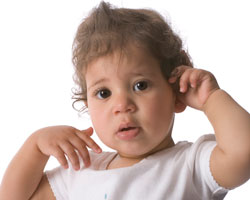Even Babies Know What's Fair
 At a playground, it’s not uncommon to hear the refrain, “That’s not fair!” It seems that young children worry a lot about fairness, but psychological scientists have typically assumed that kids don’t start to understand morality until they reach their preschool years. New research, however, on 19- to 21-month-olds has indicated that sensitivity to fairness might begin a lot earlier.
At a playground, it’s not uncommon to hear the refrain, “That’s not fair!” It seems that young children worry a lot about fairness, but psychological scientists have typically assumed that kids don’t start to understand morality until they reach their preschool years. New research, however, on 19- to 21-month-olds has indicated that sensitivity to fairness might begin a lot earlier.
and her colleagues performed two experiments designed to test infants’ sense of fairness. The first experiment involved a female experimenter giving toy ducks, cookies, or toy cars to giraffe puppets. In one trial, the experimenter distributed the goodies equally between the two puppets. In another trial, one of the giraffes received two prizes, and the other giraffe received nothing.
The researchers discovered that the infants stared at the giraffes and their prizes longer when the prizes were distributed unevenly compared to infants in the control condition. This result, they suggest in their study, occurred because the infants were surprised by the unfairness.
In a separate experiment, infants watched live events in which individuals completed chores. Based on the infants’ looking behavior, the researchers found that they expected an experimenter to reward two individuals equally after completing the chore. But the infants didn’t expect experimenters to reward the individuals equally after one worked while the other one played.
According to the study authors, infants may be born with an innate sense of fairness, or they may learn fairness by interacting with people around them. The scientists would like to conduct further research on whether young infants also have expectations about selfishness and in-group favoritism.





Comments
I am trying to source this article, who is the author?
APS regularly opens certain online articles for discussion on our website. Effective February 2021, you must be a logged-in APS member to post comments. By posting a comment, you agree to our Community Guidelines and the display of your profile information, including your name and affiliation. Any opinions, findings, conclusions, or recommendations present in article comments are those of the writers and do not necessarily reflect the views of APS or the article’s author. For more information, please see our Community Guidelines.
Please login with your APS account to comment.